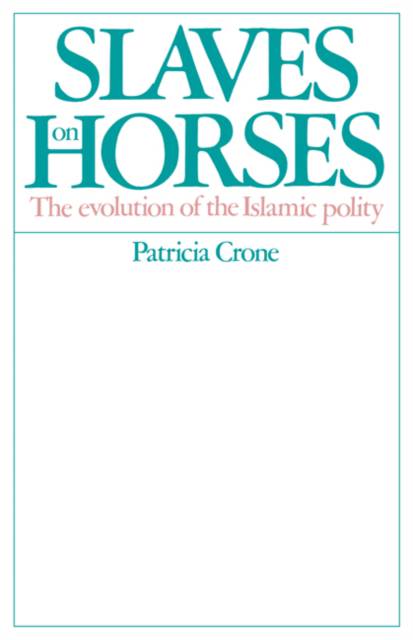
- Afhalen na 1 uur in een winkel met voorraad
- Gratis thuislevering in België vanaf € 30
- Ruim aanbod met 7 miljoen producten
- Afhalen na 1 uur in een winkel met voorraad
- Gratis thuislevering in België vanaf € 30
- Ruim aanbod met 7 miljoen producten
Zoeken
Slaves on Horses
The Evolution of the Islamic Polity
Patricia Crone, Crone Patricia
Paperback | Engels
€ 85,45
+ 170 punten
Omschrijving
Slave soldiers are a distinctively Muslim phenomenon. Though virtually unknown in the non-Muslim world, they have been a constant and pervasive feature of the Muslim Middle East from the ninth century AD into modern times. Why did Muslim rulers choose to place military and political power in the hands of imported slaves? It is this question which Dr Crone seeks to answer. Concentrating on the period from the rise of the Umayyads to the dissolution of the 'Abbasid empire (roughly AD 650-850), she documents the consequences of the fusion between religion and politics in Islam, which she sees as an essential forging characteristic of the Muslim social structure and state. Primarily addressed to specialists and advanced students of Arabic and Islamic history, the book will also appeal to comparative historians and social anthropologists.
Specificaties
Betrokkenen
- Auteur(s):
- Uitgeverij:
Inhoud
- Aantal bladzijden:
- 316
- Taal:
- Engels
Eigenschappen
- Productcode (EAN):
- 9780521529402
- Verschijningsdatum:
- 30/10/2003
- Uitvoering:
- Paperback
- Formaat:
- Trade paperback (VS)
- Afmetingen:
- 140 mm x 216 mm
- Gewicht:
- 403 g

Alleen bij Standaard Boekhandel
+ 170 punten op je klantenkaart van Standaard Boekhandel
Beoordelingen
We publiceren alleen reviews die voldoen aan de voorwaarden voor reviews. Bekijk onze voorwaarden voor reviews.











